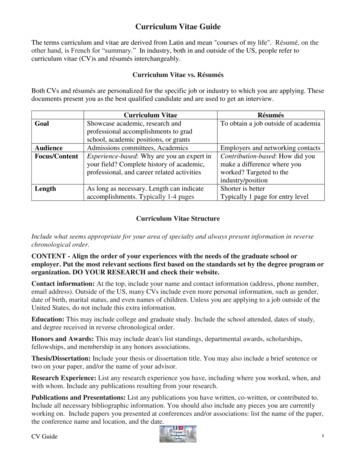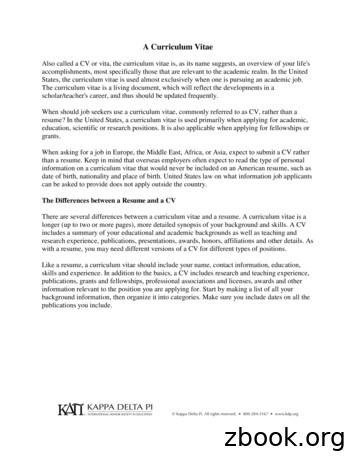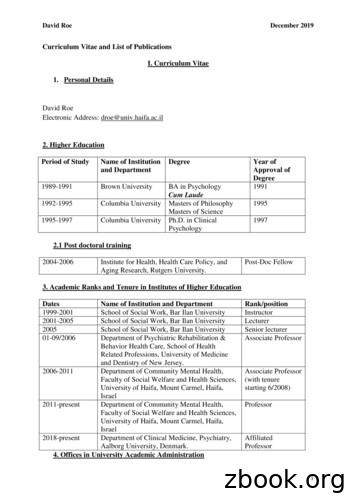Roselyn Hsueh Curriculum Vitae 1-17 - Temple University
Hsueh CV, January 2017Curriculum VitaeROSELYN HSUEHAssociate ProfessorDepartment of Political ScienceTemple University510-517-8968email: rhsueh@temple.eduEDUCATIONU.C. Berkeley, Berkeley, CaliforniaPh.D., 2008 (Political Science)Master of Arts, 2001 (Political Science)Doctoral Dissertation: “China’s New Regulatory State: The Government’s BifurcatedStrategy Toward Foreign Investment.” Committee: Steven K. Vogel (Chair), Kevin J.O’Brien, Kiren A. Chaudhry, and Thomas B. Gold.Dissertation nominated for American Political Science Association’s Gabriel Almond Awardfor Best Dissertation in the Field of Comparative Politics, 2009.Masters Thesis: “The Significant Role of Patron-Client Relationships in Development.”Readers: David Leonard, Kevin O’Brien and Pradeep ChhibberNational Taiwan Normal University, Taipei, TaiwanAdvanced Mandarin, Mandarin Training Program, 2000U.C. Berkeley, Berkeley, CaliforniaBachelor of Arts, 1999 (Political Science)Senior Honors Thesis: “Mobilization of Civil Society in Taiwan’s Path to Democratization.”Advisor: M. Steven FishACADEMIC POSITIONS HELDAssociate Professor (with tenure), Political Science, Temple University, 2016-.Assistant Professor, Department of Political Science, Temple University, 2009-2016.Visiting Professorship, Graduate School of Finance and Asia Pacific Center, Tecnológico deMonterrey, Mexico, 2014Visiting Scholar, Institute of International Studies, U.C. Berkeley, 2013-2014; FacultyResidential Research Fellow, Institute of East Asian Studies; and Visiting Scholar, Center forthe Study of Law and Society, School of Law, U.C. Berkeley, 2012-2013.Hayward R. Alker Post-Doctoral Fellow, Center for International Studies; and ResearchAffiliate, U.S.-China Institute, University of Southern California, 2008-2009.Acting Lecturer, Department of Political Science, U.C. Berkeley, 2007-2008.1
Hsueh CV, January 2017Visiting Scholar, Institute of World Economics and Politics, Chinese Academy of SocialSciences, Beijing, People’s Republic of China, 2005-2006.U.S. Fulbright Scholar to the People’s Republic of China, 2005-2006.PUBLICATIONSBook2011. China’s Regulatory State: A New Strategy for Globalization. Ithaca, NY: CornellUniversity Press, Cornell Studies in Political Economy, 320 pp.Reviewed by: Perspectives on Politics; Political Science Quarterly; Governance; TheEconomist; The China Journal; The China Quarterly; Journal of Chinese Political Science;China Economic Quarterly; China Economic Review; Indian Journal of Asian AffairsIn progress. Micro-institutional Foundations of Capitalism: The Globalization of China, India,and Russia, under preparation for review at Cambridge University Press.Peer-Reviewed Journal Articles2016. “State Capitalism, Chinese-Style: Strategic Value of Sectors, Sectoral Characteristics, andGlobalization,” Governance 29:1 (January), pp. 85-102.2015. “Nations or Sectors in the Age of Globalization: China’s Policy Toward Foreign DirectInvestment in Telecommunications,” Review of Policy Research 32:6 (November), pp. 627648.2014. “Fieldwork in Political Science: Encountering Challenges and Crafting Solutions,” coauthored and co-edited symposium (with Francesca Refsum Jensenius and AkasemiNewsome), PS: Political Science and Politics 47:2 (April), pp. 391-393.2016. Selected as the only complete symposium published in “Virtual Issue: Navigatingthe Profession: Sage Advice from the Pages of Ps,” PS: Political Science and Politics 49S1 (February).2012. “China and India in the Age of Globalization: Sectoral Variation in Post-LiberalizationReregulation,” Comparative Political Studies 45:1 (January), pp. 32-62.Peer-Reviewed Book Chapters2013. “Institutional Development and the Regulatory State in the South,” The Rise of theRegulatory State of the South: Infrastructure and Development in Emerging Economies,edited by Navroz K. Dubash and Bronwen Morgan. Law and Global Governance Series.Oxford: Oxford University Press.2
Hsueh CV, January 20172006. “Who Rules the International Economy? Taiwan’s Daunting Attempts at Bilateralism,”Bilateral Trade Arrangements in the Asia Pacific: Origins, Evolution and Implication, editedby Vinod Aggarwal and Shujiro Urata. New York, NY: Routledge.Invited Publications2016. Written Report for Oral Testimony, Hearing on China’s Shifting Economic Realities andImplications for the United States, U.S.-China Economic and Security Review Commission,United States Congress (February 24).2016. “Strategtic and Nonstrategic Sectors,” in State and Market in Contemporary China:Toward the 13th 5-Year Plan, edited by Scott Kennedy. A Report of CSIS Freeman Chair inChina Studies. Washington, D.C.: Center for Strategic and International Studies and Lanham:Rowman & Littlefield.2014. “Taiwan’s Treaty Trouble,” Foreign Affairs (June).2012. Written Report for Oral Testimony, Hearing on China’s State-Owned and State-ControlledEnterprises, U.S.-China Economic and Security Review Commission (USCC), United StatesCongress (February 15).Published Research Reports2014. “National Technology in a Globalized World: Strategic Assessments of EmergingTechnology,” with Anne Clunan, Kirsten Rodine Hardy, Margaret Kosal, and Ian McManus.PASCC Report Number 2014006, Department of Defense/ Naval Postgraduate SchoolProject on Advanced Systems and Concepts for Countering WMD (PASCC). ReportNumber 2014 –006.2004. “Mobilization of Civil Society in Taiwan’s Path to Democratization,” DSC ConferenceAcquisitions of the British Library. Wetherby, U.K.Book Reviews2015. Review of David H. Shinn and Joshua Eisenman’s China and Africa: A Century ofEngagement (Philadelphia: University of Pennsylvania Press, 2012), The China Journal 73.2012. “China’s Development Strategy and the Global Financial Crisis,” review of Justin YifuLin’s Demystifying the Chinese Economy (Cambridge: Cambridge University Press, 2011)and Nicholas Lardy’s Sustaining China’s Economic Growth after the Global Financial Crisis(Washington, D.C.: Peterson Institute for International Economics, 2012), Asia Policy (July).2011. Review of Irene Wu’s From Iron Fist to Invisible Hand: The Uneven Path ofTelecommunications Reform in China (Stanford: Stanford University Press, 2009), Journal ofChinese Political Science 16:2.3
Hsueh CV, January 20172008. Review of Yuezhi Zhao, Communication in China: Political Economy, Power, andConflict (Rowman & Littlefield, 2008), Journal of Chinese Political Science 13:3.Invited Blogging2017. “"What will Trump change about trade relations with China? Here’s what you need toknow," The Washington Post, January 10.2016. “A Primer on the Effects of Chinese Style Capitalism,” Pacific Council on InternationalPolicy,” August 30.2016. “Taiwan kicked out its ruling party for getting too close to mainland China. Here’s whatcomes next,” The Monkey Cage of The Washington Post, February 1.2015. “China manages capitalism for its own gain. This explains how,” The Monkey Cage ofThe Washington Post, September 24.2014. “Alibaba, the Golden Child of China’s Globalization Strategy, The Huffington Post,October 15.2013. “Diverging Globalizations: Lessons from China and India,” China Policy Institute Blog(University of Nottingham) and Gateway (Mumbai), May 22.2013. “The Making of the Taiwanese American Identity,” TaiwaneseAmerica.org: HighlightingTaiwanese America, May 11.2011. “How China Outsmarted the WTO,” Penn Program on Regulation RegBlog, December 26.2011. “China’s open-door-then-close-door approach to foreign investment,” Nieman Watchdog,Nieman Foundation for Journalism, Harvard University, August 25.HONORS AND AWARDSSummer Research Award, Office of the Provost, Temple University, 2017Taiwan Fellowship, Ministry of Foreign Affairs, Taiwan, 2017.Expert Witness, Congressional hearing on China’s Shifting Economic Realities and Implicationsfor the United States, U.S.-China Economic and Security Review Commission, United StatesCongress, February 24, 2016Summer Research Award, Office of the Provost, Temple University, 2015Visiting Professorship, Graduate School of Finance and Asia Pacific Center, Tecnológico deMonterrey, Mexico, 2014Faculty Residential Research Award, U.C. Berkeley, 2012-2013Temple University Junior Sabbatical Leave, Temple University, 2012-2013Expert Panelist, Congressional hearing on China’s State-Owned and State-ControlledEnterprises, U.S.-China Economic and Security Review Commission, February 15, 2012Grant-in-Aid for Research, Office of the Provost, Temple University, 2011Summer Research Award, Office of the Provost, Temple University, 2010Faculty Senate Seed Money Grant, Temple University Research Incentive Fund, 2010Joseph Stiglitz Workshop on Poverty, Development and Globalization, Columbia University’sInitiative for Policy Dialogue and University of Manchester’s Brooks World Poverty Institute,2008.Hayward Alker Post-Doctoral Fellowship, University of Southern California, 2008-2009IEAS Graduate Fellowship, Institute of East Asian Studies, U.C. Berkeley, 2007David L. Boren Graduate Fellowship, National Security Education Program, 2006-20074
Hsueh CV, January 2017Fulbright Foundation Fellowship, Department of State, U.S. Government, 2005-2006Pacific Rim Research Program Grant, Office of the President University of California, 2005Graduate Division Summer Grant, U.C. Berkeley, 2001National Science Foundation Graduate Fellowship, Honorable Mention, 2001University Multiyear Graduate Fellowship, U.C. Berkeley, 2000-2008Mark U. Edwards Endowed Scholarship, U.C. Berkeley, 1998.Cal-in-the-Capital Intern, Washington, D.C., 1997Greenline-Oliver Endowed Scholarship, U.C. Berkeley, 1997.Senator, Associated Students of the University of California (ASUC), 1996-1997Student Representative, Academic Senate Library Committee, U.C. Berkeley, 1996-1997California Alumni Scholarship, U.C. Berkeley, 1995-1999CURRENT RESEARCHUnder Peer Review“How China is impacting Business-State Relations in Africa: The Cases of Angola and Nigeria,”coauthored with Michael B. Nelson, under review at World Development.Book ManuscriptMicro-institutional Foundations of Capitalism: The Globalization of China, India, and Russia,under preparation for review at Cambridge University Press.Papers-in-Progress“Globalization and Market Governance: Different Paths to Development in China and Russia,”article under preparation for peer review.“Super Suits and Strategic Technology: Analyzing Strategic Regulation in the Textile Industry inChina and India,” article under preparation for peer review.“Who Defines National Interest in Taiwan’s Trade Policy: Partisan Politics, Developmental StateLegacy, and the Role of Industry and Business Associations”Other Research ProjectsThe Relationship Between Economic and Social Control: The Politics of Market Governance inChina’s Social PolicyThe Politics of Trade Policy and the Political Economy of Identity in Post-Developmental StateEast AsiaStudies in Contemporary Taiwanese Christianity (co-editor)Taiwanese Christianity in the Sunflower Era (co-editor)5
Hsueh CV, January 2017INVITED PAPERS AND PRESENTATIONS AT PROFESSIONAL MEETINGS“Diverging Globalizations: National and Sectoral Pathways to Development in China and India,”paper on the panel, “Reassessing the Sub-National Approach to China and India’s PoliticalEconomies,” proposed for presentation at the Annual Meeting of the American PoliticalScience Association, San Francisco, CA, August 31 - September 3, 2017.“Strategic Value, Institutions, and Sectoral Structures: Divergent Development of GlobalTextiles in China and Russia,” paper accepted for presentation on panel, “AuthoritarianAdaptability: Comparative Trajectories in China and Russia,” at the Annual Convention ofthe International Studies Association, Baltimore, MD, February 22, 2017.“Market Governance and Globalization: National and Sectoral Paths to Development,” on panel,“Transformations for Understanding State Capitalism,” at the Annual Meeting of theAmerican Political Science Association, Philadelphia, PA, September 1-4, 2016.“Dynamic Authoritarianism: Market Pathways in China & Russia Telecommunications,” selforganized panel, “Governing Markets & Politics in Information Communications in China& Russia” at the Annual Meeting of the American Political Science Association,Philadelphia, PA, September 1-4, 2016.“Comparative Perspectives on China’s Regulatory State,” co-organized roundtable at the AnnualMeeting of the American Political Science Association, Philadelphia, PA, September 1-4,2016.“Market Governance and Globalization: National and Sectoral Paths to Development,” in“Building Bridges between Economic Sociology and International Relations” at the 28thAnnual Meeting conference of the Society for the Advancement of Socio-Economics,University of California, Berkeley, June 24-26, 2016.“Dynamic Authoritarianism: Market Pathways in China & Russia Telecommunications” in“Markets, Firms and Institutions” at the 28th Annual Meeting conference of the Society forthe Advancement of Socio-Economics, University of California, Berkeley, 24-26 June 2016.“China versus India: Two Paths to Global Economic Integration,” paper accepted forpresentation on co-organized “Political Economy in the Rise of China and India,” panel atthe Annual Meeting of the American Political Science Association, San Francisco,September 3-6, 2015.“Foreign Capital Liberalization and Development: China and Russia Compared,” paper acceptedfor presentation at the Annual Meeting of the American Political Science Association, SanFrancisco, September 3-6, 2015.“Super Suits and Strategic Technology: Analyzing Strategic Regulation in the Textile Industry inChina and India,” Annual Convention of the International Studies Association, Toronto,March 26-29, 2014.6
Hsueh CV, January 2017“National Sector-specific Global Integration: Comparing Labor and Capital-Intensive Textiles inChina and India,” self-organized panel, “Understanding Globalization Through The Politicsof Sectors,” Annual Convention of the International Studies Association, Toronto, March 2629, 2014.“Capitalism Chinese-Style: The State, Strategic Value of Sectors, and Market Governance,”paper prepared for 42nd Taiwan-American Conference on Contemporary China, Institute ofInternational Relations (IIR), National Chengchi University (NCCU), Taiwan, December 56, 2013.“Super-Suits and Strategic Technology: Analyzing Strategic Regulation in the Textile Sector InChina and India,” paper prepared for panel, “Governing Nanotechnology in a GlobalizedWorld II: Cross-National Dimensions,” at Society for the Study of Nanoscience andEmerging Technologies (S.NET), 5th Annual meeting October 27-30, 2013, Boston.“Strategic Value, Domestic Institutions, and Sectoral Structures: The Globalization ofTelecommunications in China and India,” self-organized panel, “Comparative PoliticalEconomy of China and India,” at the Annual Meeting of the American Political ScienceAssociation, Chicago, August 31, 2013.“How is China Impacting Business-State Relations in Africa?” (with Michael B. Nelson),Annual Meeting of the American Political Science Association, Chicago, August 30, 2013.“Who Wins? China Wires Africa: The Cases of Angola and Nigeria,” paper prepared forthe NYU/Giessen Development Finance Conference, New York University School of Law,New York, New York, April 9, 2013.“Governing Nanotechnology in a Globalized World: Cross-National Dimensions and StrategicAssessments of a Disruptive Technology,” Research Workshop for Collaborative Project ofNaval Postgraduate School/ Northeastern University/ Georgia Institute of Technology/Temple University on Nanotechnology, San Francisco, April 5-6, 2013.“Neoliberalism and Global Development: Lessons from Developing Countries and Sectors,”Annual Convention of the International Studies Association, San Francisco, April 3-6, 2013.“The Relationship Between Economic and Social Control: The Politics of Market Governance inChina’s Social Policy,” Residential Research Fellow Working Group, Institute of East AsianStudies, U.C. Berkeley, Berkeley, CA, October 31, 2012.“Strategic Value, Domestic Institutions, and Sectoral Structures: The Globalization ofTelecommunications in China and India,” self-organized panel, “Comparative PoliticalEconomy of China and India,” at the Annual Meeting of the American Political ScienceAssociation, New Orleans, Louisiana, August 2012.“Defying Conventional Wisdom: Variation in the Market Liberalization of TelecommunicationsServices in China and India,” co-organized panel, “Comparative Political Economy of China7
Hsueh CV, January 2017and India,” presented at the Annual Convention of the International Studies Association, SanDiego, California, April 1-4, 2012.“Who Wins? China Wires Africa,” co-authored paper (with Michael Nelson), Annual Meeting ofthe African Studies Association, Washington, D.C., November 17, 2011.“State-making and Globalization: The Microfoundations of China’s Grand Strategy,” AnnualMeeting of the American Political Science Association, Seattle, Washington, September 3,2011.“Understanding Sectoral Reregulation in China’s New Regulatory State,” Annual Meeting of theLaw and Society Association, San Francisco, June 2, 2011.“Foreign Capital Liberalization and Development: Lessons from Nations and Sectors,” AnnualConvention of the International Studies Association, Montreal, Quebec, March 18, 2011.“Nations or Sectors in the Age of Globalization: The Case of China,” Annual Meeting of theSociety for the Advancement of Socio-Economics, Philadelphia, June 26, 2010.“Chinese Capitalism in the Age of Globalization: Evidence from Telecommunications andTextiles,” self-organized and chaired panel, “China’s New Regulatory State: Social andEconomic Regulation Considered,” at the Annual Conference of the Association of AsianStudies, Philadelphia, March 25-28, 2010.“China and India in the Age of Globalization: Variation in the Reregulation of Foreign DirectInvestment,” Annual Meeting of the American Political Science Association, Toronto,September 3, 2009.“Lessons from China and India: National Models of Sectoral Integration into the InternationalEconomy,” panel on “FDI and Development” Annual Convention of the International StudiesAssociation, New York, February 17, 2009.“China and India: Variation in the Reregulation of Foreign Direct Investment in the Age ofGlobalization,” panel, “Politics of FDI,” Annual Convention of the International StudiesAssociation, New York, February 17, 2009.“Crossing the River By Feeling for the Stones: Conducting Research in Varying Contexts inChina,” co-organized panel, “The Nuts and Bolts of Challenging Fieldwork,” at the AnnualMeeting of American Political Science Association, Boston, August 28-31, 2008.“China’s Liberalization Two-Step: A Response to Globalization,” Initiative for Policy DialogueTask Force on China, Columbia University, University of Manchester, June 25-26, 2008.“Who Wins?: China Wires Africa,” co-authored paper accepted for delivery at AnnualConvention of International Studies Association, San Francisco, March 26-29, 2008.8
Hsueh CV, January 2017“The Chinese State and Foreign Capital: Who Controls Whom,” self-organized panel,“Globalization Reexamined: The State and FDI in Comparative Perspective,” at the AnnualMeeting of American Political Science Association, Chicago, August 30, 2007.“The Chinese State and Foreign Capital: Who Controls Whom” panel on “The Politics ofLiberalization,” Annual Meeting of Midwest Political Science Association, April 15, 2007.“Who Rules the International Economy? The State-System, Domestic Forces or the Market,”edited volume workshop for Bilateral Trade Arrangements in the Asia Pacific: Origins,Evolution and Implication, East West Center, Honolulu, Hawaii, December, 2003.“Mobilization of Civil Society in Taiwan’s Path to Democratization: The Case of the TaiwanesePresbyterian Church,” North American Taiwan Studies Conference, Harvard University,June 16-19, 2000.Invited Presentations“Diverging Globalizations: National and Sectoral Pathways to Develo
2012. “China and India in the Age of Globalization: Sectoral Variation in Post-Liberalization Reregulation,” Comparative Political Studies 45:1 (January), pp. 32-62. Peer-Reviewed Book Chapters 2013. “Institutional Development and the Regulatory State in the South,” The Rise of the
HUA-HSUEH T'UNG-PAO /CHEMISTRY BULLETIN/ No k, 23 Jul l6 1 HUA-HSUEH T'UNG-PAO /CHEMISTRY BULLETIN/ No- 5, 23 Sep 76 11 CHUNG-HUA I-HSUEH TSA-CHIH /CHINESE MEDICAL JOURNAL/ No 11, 15 Nov 76 . . 20 . AUTHOR: CHANG Chu-churi 14545 4554 0689] ORG: Department of Chemistry, Northwestern University 51 TITLE: "Application of Chemiluminescence .
Curriculum Vitae Guide The terms curriculum and vitae are derived from Latin and mean "courses of my life". Résumé, on the other hand, is French for “summary.” In industry, both in and outside of the US, people refer to curriculum vitae (CV)s and résumés interchangeably. Curriculum Vitae vs. Résumés
CV curriculum vitae CV v. resume – Length – Scholarly/scientific. Curriculum Vitae CV curriculum vitae CV v. resume – Length – Scholarly/scientific – Detailed. Curriculum Vitae (CV) Name, title, curren
author*) 35. Tseng CJ, Pao CC, Tseng LH, Chang TC, Lai CH, Soong YK, Hsueh S, Jyu-Jen H. Lymphoepithelioma-like carcinoma of the uterine cervix. Cancer 1997; 80:91-97. . (corresponding author*). 48. Chang TC, Hsueh S, Lai CH, Tseng CJ, Lee KF, Huang KG, Chou HH, Soong YK. Phase II trial of neoadjuvant chemotherapy in early-stage small cell .
A Curriculum Vitae Also called a CV or vita, the curriculum vitae is, as its name suggests, an overview of your life's accomplishments, most specifically those that are relevant to the academic realm. In the United States, the curriculum vitae is used
3.0 TYPES OF CURRICULUM There are many types of curriculum design, but here we will discuss only the few. Types or patterns are being followed in educational institutions. 1. Subject Centred curriculum 2. Teacher centred curriculum 3. Learner centred curriculum 4. Activity/Experience curriculum 5. Integrated curriculum 6. Core curriculum 7.
1 Curriculum Vitae and List of Publications I. Curriculum Vitae 1. Personal Details David Roe Electronic Address: droe@univ.haifa.ac.il 2. Higher Education Year of Approval of Degree Name of Institution Degree and Department Period of Study BA in Psychology 1991 Cum Laude 1989-1991 Brown University Masters of Philosophy 1995 Masters of Science
Academic writing is explicit in its signposting of the organisation of the ideas in the text: ever built in Britain. However, even by the end Partly this was because the current control of the land. Similarly, Marx was interested his own family. In addition, he has a between orders and bishops. For example, in the Northern context. Explicitness Academic writing is explicit .























